“Black Lodge/White Lodge” is the 25 Years Later version of the popular point/counterpoint style of debating, wherein two sides take opposing views and hash it out on stage. Here, we’ll be debating the finer points of Twin Peaks lore, in writing, for your reading pleasure.Today’s debate features: Ali Sciarabba and Mat Cult The topic is: Who killed Laura Palmer?
Black Lodge: by Ali Sciarabba
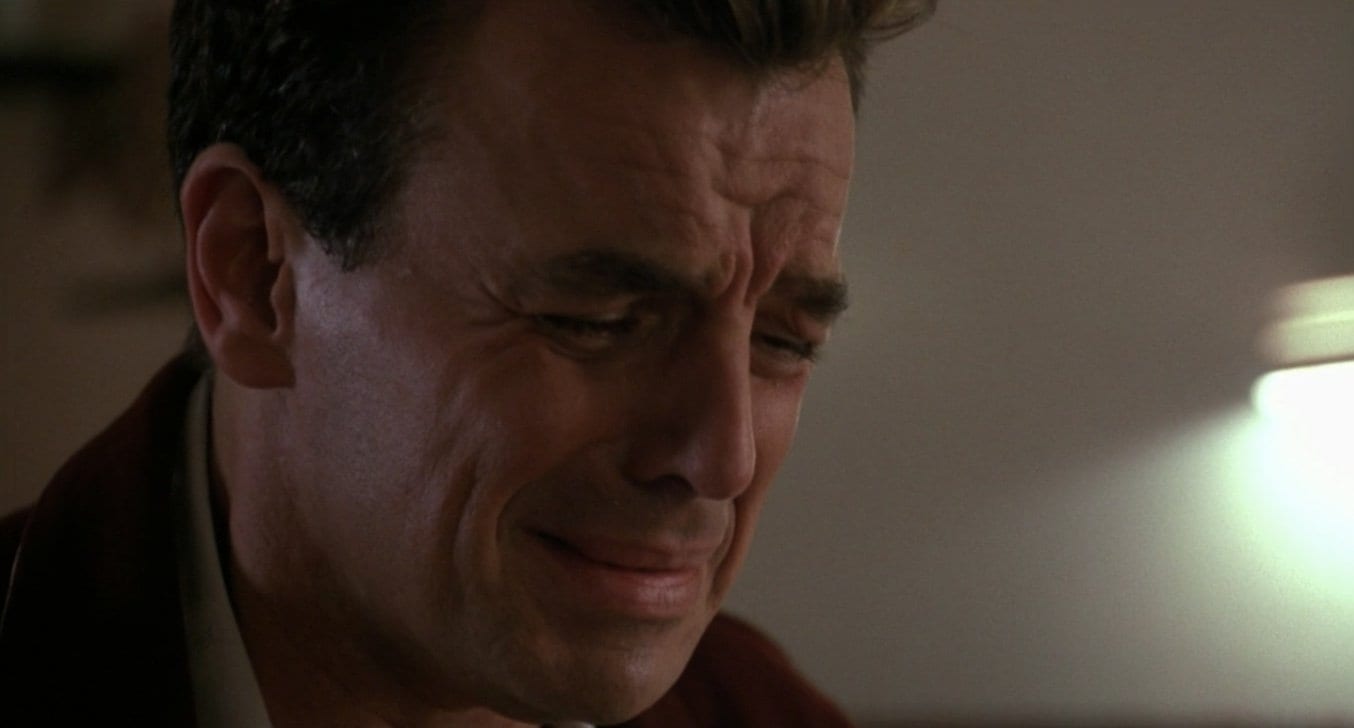
It is an indisputable fact that Leland Palmer was possessed by BOB since his childhood. It is also true that BOB is real and not just someone created in Laura’s mind as a defense mechanism to suppress the knowledge that her father was her rapist. BOB exists in the world of Twin Peaks, and he is the embodiment of the evil that men do. That said, I cannot and will not absolve Leland Palmer of all responsibility for the things that he’s done. I think there’s ample evidence in Fire Walk With Me that he was partially aware of his actions. There is evidence to suggest that BOB was not always behind the wheel when Leland shed the Mr. Nice Guy façade.
The original series asks us to give Leland a pass. It asks us to consider him only a victim. It asks us to believe BOB when he says that Leland knew nothing and to believe Leland when he says he didn’t remember. Many people choose to believe this because it is the easy answer to an awful question. No one wants to think about the alternative—that there are men who can wear one face in public and another in private. But these men exist in our world, with no BOBs inside them. To excuse Leland all his transgressions in light of evidence presented in FWWM—which was Laura’s story—is to be willfully ignorant.
The original series presents us with a Leland who is grieving and has no memory of any of his actions. We see him fully possessed by BOB at times, most hauntingly during Maddy’s murder. But Fire Walk With Me presents us with an entirely different Leland—a Leland who, at times, remembers what he has done. He’s not able to fully repress everything, and this invalidates the original series’ claims that BOB was in full control and that Leland knew nothing until BOB left his vessel just before his death. Leland may have been able to repress some things, with BOBs help or without it, but the memories of his actions did surface.
The most obvious example of this is his sexual relationship with and murder of Teresa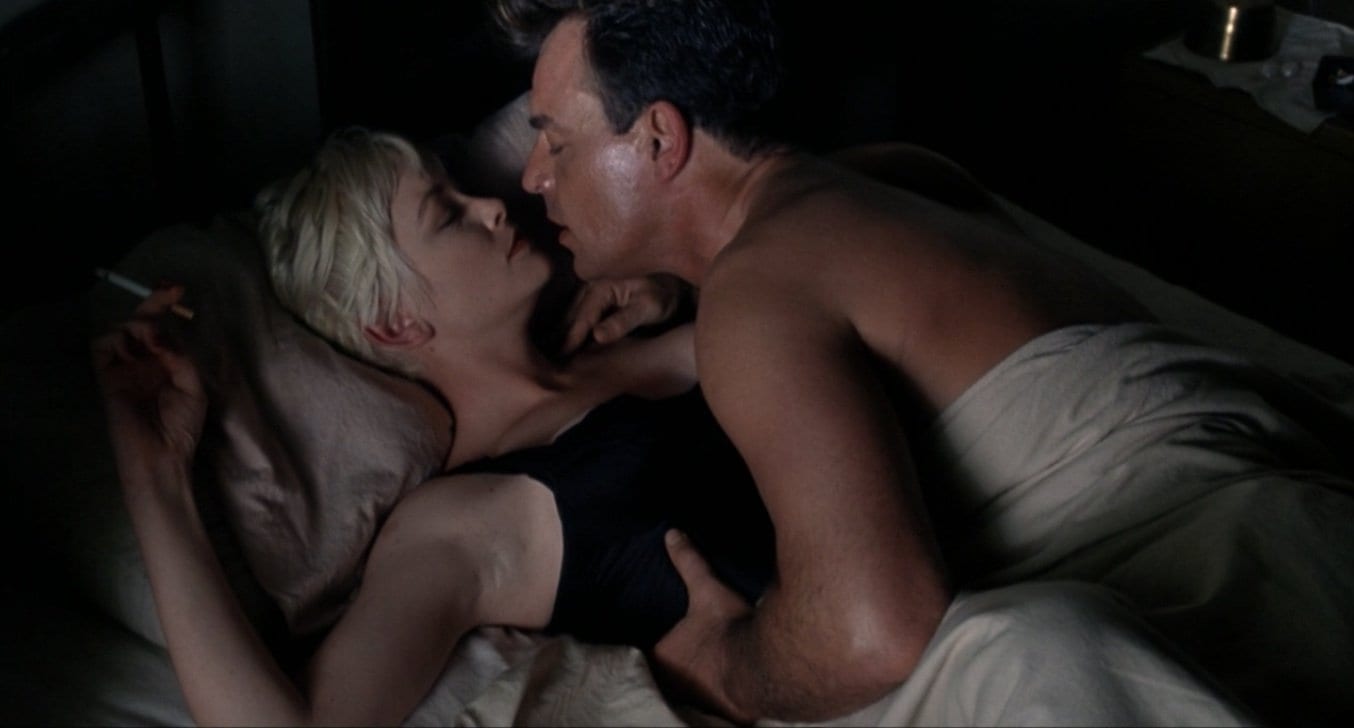 Banks. He is not in BOB-mode when he seeks out Teresa Banks in Fleshworld and meets up with her for sex at the motel. Consensual sexual encounters aren’t historically BOB’s thing so I don’t think it’s unreasonable to think that this is just Leland Palmer cheating on his wife. One of the most disturbing things about this is that he says of Teresa Banks, “you look just like my Laura.” Leland compares a woman he is having sex with to his daughter in a way that suggest that perhaps his desire for Laura was not just BOB’s will.
Banks. He is not in BOB-mode when he seeks out Teresa Banks in Fleshworld and meets up with her for sex at the motel. Consensual sexual encounters aren’t historically BOB’s thing so I don’t think it’s unreasonable to think that this is just Leland Palmer cheating on his wife. One of the most disturbing things about this is that he says of Teresa Banks, “you look just like my Laura.” Leland compares a woman he is having sex with to his daughter in a way that suggest that perhaps his desire for Laura was not just BOB’s will.
When Leland arranges a “party” with Teresa and other girls, and one of the other girls turns out to be Laura, it is not BOB but Leland who is terrified of being seen by her. He also doesn’t want Teresa to know his real identity. So he runs away, and he later murders Teresa. BOB may be behind the wheel during the murders, but it seems awfully convenient that Teresa is the victim. It certainly makes Leland’s life easier if she’s out of the picture because she knows too much.
And we know that Leland remembers this because he has flashbacks of it in the car after the incident where Phillip Gerard/MIKE chases them. There’s not a lot of ambiguity here and the implication of the flashbacks placed in this context is that Leland remembers being with Teresa, seeing Laura and Ronette, and killing Teresa. And yet he manages to keep it together in the car with Laura. There is no outburst of horror and disgust as there was in the jail cell in the original series when, supposedly, all the memories came back to him at once.
According to FWWM—which is Lynch’s own work—Leland has some level of control and knowledge over his behavior. He’s not the perfect husband and father. There is a darkness he hides, which comes out in that house. The memorable and haunting scene where he obsesses over Laura’s dirty hands is another example of Leland-as-Leland being cruel and terrorizing his daughter. His obsession with which one of her “lovers” gave her the heart necklace is particularly disturbing.
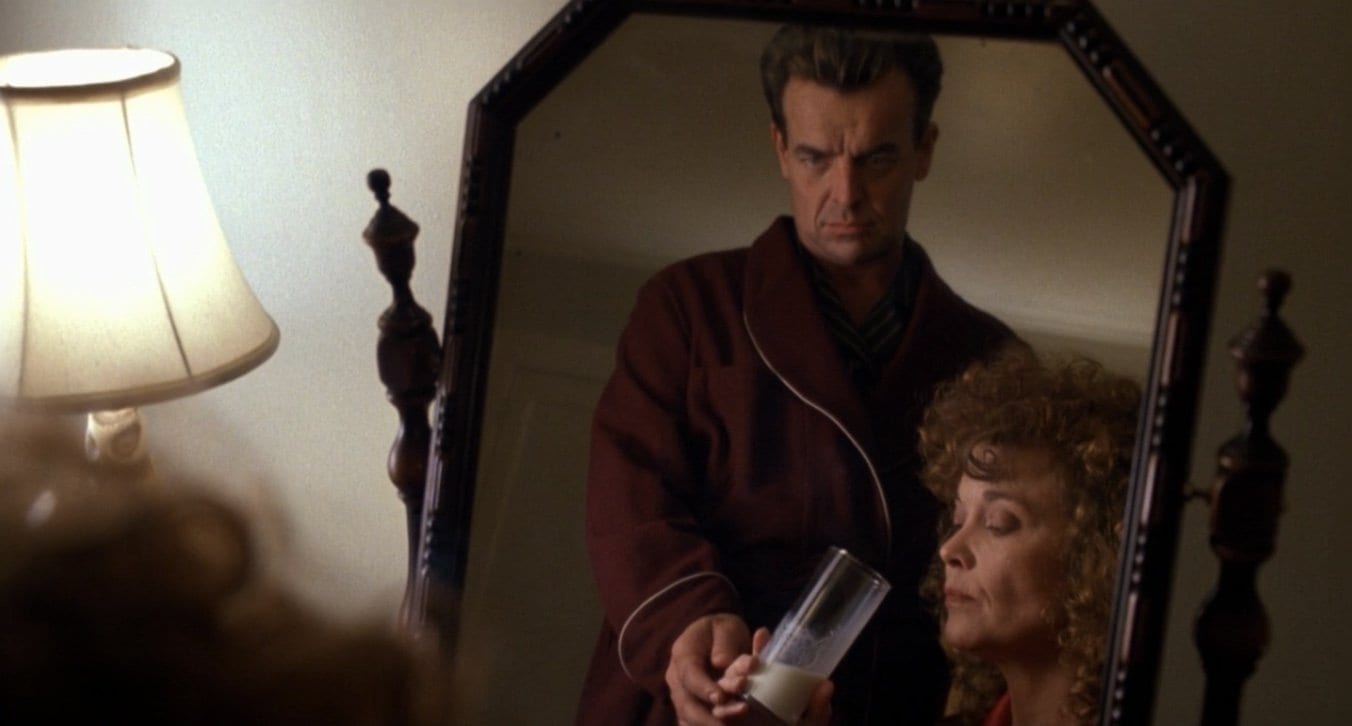 And, again, he knows what he’s done. He remembers it later that evening and goes into Laura’s bedroom to apologize. He is “himself” again in this scene, but this doesn’t mean that the cruel Leland is BOB-specific. Nice Guy Leland is one side to the coin; Dirty Hands Leland is the other. Dirty Hands Leland is the one who drugs Sarah so he can rape his daughter undisturbed. BOB is in there but it could be argued that he’s just along for the ride. It’s an unfortunate truth that there are people in this world who can turn on a dime—one moment kind and the next terrifying. And there’s always an apology afterward. It’s the way of the abuser. Leland Palmer is no different, and we watch it happen in FWWM.
And, again, he knows what he’s done. He remembers it later that evening and goes into Laura’s bedroom to apologize. He is “himself” again in this scene, but this doesn’t mean that the cruel Leland is BOB-specific. Nice Guy Leland is one side to the coin; Dirty Hands Leland is the other. Dirty Hands Leland is the one who drugs Sarah so he can rape his daughter undisturbed. BOB is in there but it could be argued that he’s just along for the ride. It’s an unfortunate truth that there are people in this world who can turn on a dime—one moment kind and the next terrifying. And there’s always an apology afterward. It’s the way of the abuser. Leland Palmer is no different, and we watch it happen in FWWM.
Finally, there is Leland’s own admission during the train car scene. It has stuck with me and haunted me since I first saw FWWM: “I always thought you knew it was me,” he says to Laura, just before he kills her. And we know that it’s Leland because he then says, “Don’t make me do this.” There’s zero ambiguity here. He knew what he did to her and he thought Laura always knew as well.
I don’t believe that Leland wanted to kill Laura but he killed her all the same. I think he was forced into it by the knowledge that, if he didn’t, BOB would take Laura. Because Leland loved Laura, but it was in that sick and twisted way that an abuser loves their victim. Knowing what we know about Leland Palmer from FWWM, which in my mind is more canon than Season 2, I can’t absolve him of his many, many sins.
White Lodge: by Mat Cult
Leland Palmer is no saint. Let’s be clear. He has been party to some terrible things, but on that night, in that moment, when Laura was brutally stabbed to death in a train carriage in the woods, BOB was in the driving seat. The demon was in control. BOB killed Laura.
In the supernatural realm in which Twin Peaks operates, where demonic possession is a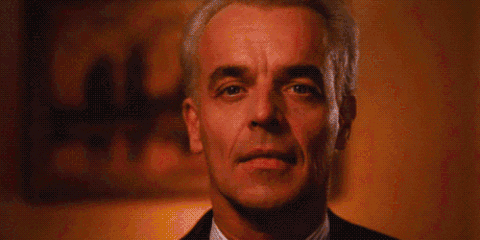 real-world condition, it will always be hard to separate the actions of host and parasite. Exactly who is culpable for the terrible acts they commit together? How complicit is the host? These are knotty problems, but I think there is some compelling evidence to suggest that BOB was in control on that terrible, tragic night.
real-world condition, it will always be hard to separate the actions of host and parasite. Exactly who is culpable for the terrible acts they commit together? How complicit is the host? These are knotty problems, but I think there is some compelling evidence to suggest that BOB was in control on that terrible, tragic night.
Rewatching Fire Walk With Me, in preparation for this debate, I was struck by the fact that as Leland takes Ronette and Laura through the woods, Philip Gerard appears, sensing the presence of BOB. The shoe-salesman, who is host to the inhabiting spirit MIKE, recognises his former familiar is near – the presence of Leland, the host, is irrelevant. He knows BOB is on the move and planning something horrific and he immediately reacts. Post-Return, we now know that MIKE appears to be the keeper of the Owl Cave Ring, and he deploys this tool as a lifeline for Laura, offering her an empowered escape, a way to avoid possession by BOB. All of MIKE’s actions point not to Leland, but to BOB. Mike is not reacting to a man, but to a rogue Lodge spirit.
If the man who terrorised Ronnette and Laura in the woods that night was just a man without a supernatural, demonic force in the driving seat, then the Owl Cave Ring would have no impact. This supernatural artefact would have no significance to Leland – and yet we hear her killer shout “No! Don’t make me do this” as Laura puts on the ring. The only reason this talisman has any power over the way the scene plays out is because it affects BOB’s ability to possess Laura, and therefore drives him to kill her instead.
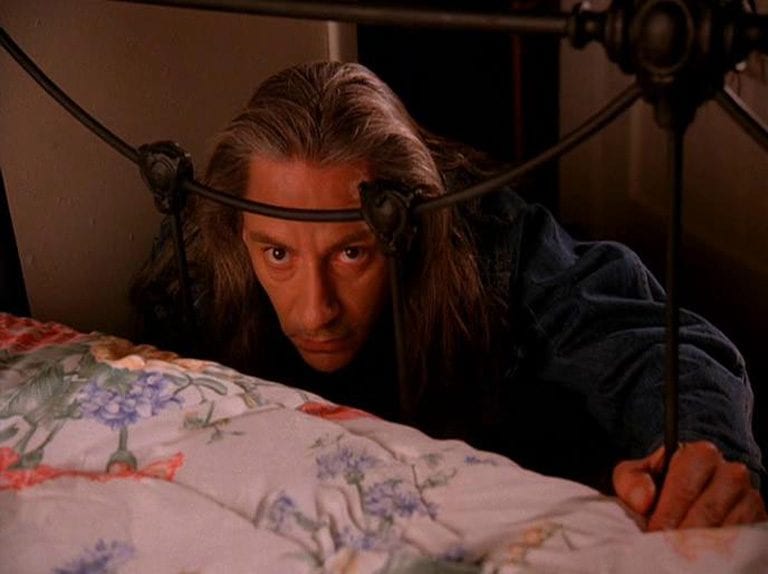 Although the host, Leland is often shown on screen during this sequence, there are also many cuts to face of BOB, especially in the climactic moments, as the knife is brought down again and again. The demon is providing the furious momentum behind this violence. His presence is made clear over and over again in visual flashes and transformations. BOB is even briefly shown in Laura’s own reflection. For his image to be so integrated into the fabric of the scene, is a clear sign that he is key to the events that take place.
Although the host, Leland is often shown on screen during this sequence, there are also many cuts to face of BOB, especially in the climactic moments, as the knife is brought down again and again. The demon is providing the furious momentum behind this violence. His presence is made clear over and over again in visual flashes and transformations. BOB is even briefly shown in Laura’s own reflection. For his image to be so integrated into the fabric of the scene, is a clear sign that he is key to the events that take place.
Looking back at Laura’s death, in light of The Return, it is impossible to think of BOB simply as a literary device – a manifestation of, or metaphor for, the cycle of abuse. In the third season of Twin Peaks, BOB is portrayed as a bona fide supernatural entity. We have seen the story of his creation, his unholy birth, and we have seen BOB operating independently of Leland, out in the real world, using Cooper’s doppelganger as a host, with support from an a small army of Woodsmen. BOB is a demonic force with drives, desires and abilities that go far beyond whichever body is hosting him at that moment. To BOB, we are just fleshy vehicles, sources of pain – a means to an end. To believe even for a moment that Leland could control such a force of nature seems to go against everything we are shown in The Return. And so it stands to reason that BOB was in control when Laura was murdered.
But wait, does this explanation let the host off the hook? Does this version of events give 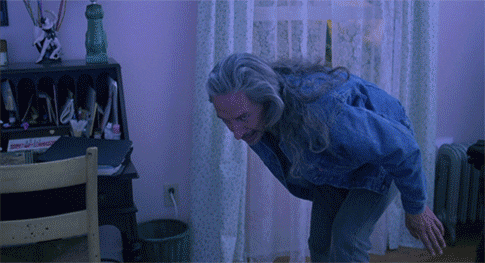 him a pass? If BOB is in control, does this exonerate Leland from the years of horrific sexual abuse BOB inflicted on his daughter, Laura? Here’s the thing – I don’t think it does. Even if he wasn’t in control during these moments, I believe Leland was aware of the horrific deeds BOB was committing using him as a vehicle. And once he was aware, if he really wanted to stop BOB he should have taken action – sought help, taken extreme measures, anything to end his daughter’s suffering. Just as MIKE removed an arm to rid himself of the murderous force that was once a part of him, so Leland could have acted to remove BOB from himself. But he didn’t, and so he is complicit. He shares the guilt and blame. But he isn’t in control.
him a pass? If BOB is in control, does this exonerate Leland from the years of horrific sexual abuse BOB inflicted on his daughter, Laura? Here’s the thing – I don’t think it does. Even if he wasn’t in control during these moments, I believe Leland was aware of the horrific deeds BOB was committing using him as a vehicle. And once he was aware, if he really wanted to stop BOB he should have taken action – sought help, taken extreme measures, anything to end his daughter’s suffering. Just as MIKE removed an arm to rid himself of the murderous force that was once a part of him, so Leland could have acted to remove BOB from himself. But he didn’t, and so he is complicit. He shares the guilt and blame. But he isn’t in control.
It will always be hard to pick apart the actions of two entities inhabiting a single frame. Where exactly does the boundary of control and responsibility lie? For me, it is clear that the responsibility is shared, but the control – that lies with BOB.
Do you have a topic for Black Lodge/White Lodge? Do you want to write it? We want YOU! Send an email to Lindsay and let us know your ideas and you could be featured in an upcoming Black Lodge/White Lodge debate!


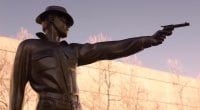
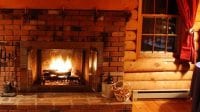

Thanks for this gals & guys of 25 yrs later. After recently re-watching FWWM & S1 of original TP, I am leaning more toward Ali’s theory above. Though, I admit I’m a bit in the Gray Lodge still, at times.
While watching that scene at Laura’s dining room table and the interaction with Leland, her FATHER, and her Mother made me sick again. Somehow even more so then when I saw it 25 years ago. I found myself feeling really pissed off at Sarah for not doing ANYTHING to help or protect her daughter.
I don’t believe that she was that drugged, in that very moment, that she was completely powerless. Plus, we know that he was “having” her since she was 12 years old. I mean, c’mon Sarah! Don’t tell me you didn’t know this was going on.
It’s a problem that we all face, I think, as we start in with this show. It’s not easy to parse it simply. I think a lot of people feel very uncomfortable with Dale’s exoneration of Leland in Episode 17. You just can’t brush this stuff under the rug
I’m of a totally different camp in that regard. I think Cooper can easily brush it under the rug because he’s the one who placed it all on Leland in the first place.
Twin Peaks may be a dream (be it a dream or a daydream). Both Phillip Jeffries and Dale Cooper stated this. People are so in love with Laura’s story (and in condemning Leland because of it), that we forget that we can’t trust everything we see, and one large possibility remains unexplored.
That BOB exists not necessarily as “the evil that men do” but as the dreamworld equivalent of framing an innocent man.
Think about that scene after Leland’s death where everyone is discussing if he was guilty or not. People cling to Albert’s observation, because it’s more realistic, but if it’s the dreamer’s equivalent of a discussion over guilt, it could just as easily work as the police wondering if they got the right man. When Harry S Truman is thinking they didn’t, and that the real killer is still out there, it leaves off on a shot of Dale Cooper.
It was Cooper whom initiated Leland’s arrest after suddenly remembering Laura whispered “My father killed me”. But the funny thing about that was the words were in normal speech. Laura NEVER talked that way inside of the Red Room. Her words were always backwards forwards. Cooper is the only one inside of the Lodge whom speaks normally (besides the female “whisper” in the Return, and that definitely wasn’t Sheryl Lee). I think he put those words inside of her mouth, just as he influenced and twisted the whole dream to suit the narrative he wanted. He wasn’t consciously aware of it but on a subconscious level it was there.
Dale Cooper, or whoever’s he is (I’m pretty certain it’s William Hastings) is our dreamer.
So Cooper claimed that Laura said her father killed her, but on the 2nd season finale, Leland’s doppleganger (representing the things that are hidden) directly counters this by stating, “I did not kill anybody”. This is really an odd statement since he was responsible for Jacques’ death, that one he always took credit for, repeatedly answering “Yes” to the accusation. Now, however, he’s denying even this? This won’t be the last time David Lynch writes Leland as denying what he was accused of either. In the “Between Two Worlds” discussion with the Palmers, he has Leland once again claim “I didn’t do those things”.
After having stated his innocence in the Red Room, Leland’s doppleganger then goes to whisper something into Dale’s ear, just like his daughter had, probably the real identity of the killer.
Dale backs away, though, because, deep inside, he already knows what Leland is going to tell him.
It’s really him.
Next Cooper turns to see an image that sends him running. His doppleganger (what HE has hidden) standing behind Leland Palmer.
This scares him.
If we look back, though, it’s not the first thing that did. The first thing to absolutely terrify Dale inside of the Lodge was Laura’s doppleganger (her hidden side) screaming bloody murder at him. Laura would do it for a second time following Annie/Caroline’s talk about having seen the face of the man who killed her.
I think this goes hand in hand with what Harold Smith said about the ultimate secret being, knowing who killed you.
Laura knows.
It was Dale, or whomever has hidden himself away inside the dream as Dale Cooper (once again, I’m sure it’s William Hastings).
Mark Frost’s script for that finale was radically changed when Lynch got his hands on it. We went from Laura coming to save Cooper, to the other creator of the show having her repeatedly scream at him in horror and anger. He even carried this over to The Return when we discover Laura was really screaming at Dale in the woods.
I don’t think we examine the role of the dopplegangers within the Lodge nearly enough. Dopplegangers are not separate from the person they represent. This is illustrated in Andy’s vision when he sees the Fireman. In it, he sees Dale split into two. Mr. C COMES from Cooper. Dopplegangers are simply what a person has hidden, or the repressed parts of themselves. If they are what a person hides, then they are closely tied to the truth, at least inside of the Lodge. We don’t usually hide a lie. We parade that around, hoping others will believe it. We do hide a truth we don’t want others to know, preferring that never gets discovered. Inside of the Lodge, we also saw the evolution of the Arm screaming at Cooper “Non-existent!” and if we remember what Dale later deduced inside his subconscious, that it was all a dream, those words seem likely to be the truth as well.
Think about the first time we saw the flashing light it wasn’t when Leland identified his daughter’s body but when Cooper was examining her. Likewise, why, if Leland had been abusing Laura for years does Sarah only see BOB after Dale has come to Twin Peaks? Dale planted him there to save himself, framing an innocent man for his own guilt, but within the workings of a dream. As Jean Renault said, Cooper brought the nightmare to Twin Peaks with him.
To further state why I think it couldn’t have been Leland harming his daughter, I’ll use Laura’s own words from the David Lynch penned “Between Two Worlds”: “And then there was a time when I cried because I was so happy, because I saw what it was. And it was so beautiful. I was awake.”
What about being molested, raped and murdered by your own father would be so beautiful it would make you cry and make you happy? Why would David Lynch even write that?
It has to be something else, something where she was relieved because it wasn’t really her father whom had hurt her.
I believe Leland was corrupted, and that’s why BOB could get in; I think the demonic presence in TP operates the same way as that in Lost Highway – it doesn’t go where it hasn’t been invited.
I differ about Leland’s fleeing when he sees Laura in that motel cos he don’t want her to see him. I think he flees because he was gonna have sex with two younger girls, but not with his daughter of course, that would be horrible.
Except when he leaves, the masked jumping man appears. Because a part of Leland does want to have incestual sex, and in fact, already has. This is, maybe, the moment when cracks start appearing in the mask. (remember that even Laura didn’t know that Leland and BOB were one until a few days before her death)
Not much later Leland kills Teresa Banks. I’m pretty sure that was Leland’s doing, not BOB’s – in the Missing Pieces, Teresa finds out Leland is Laura’s father, and there is blackmailing going on.
But then it was BOB who put the letters underneath her nails; it was BOB’s involvement that made Teresa’s murder a Blue Rose case.
Maybe, by killing Teresa, by becoming a murderer by his own accord, Leland allowed BOB to take a stronger hold on him, the line beetween host and spirit became more blurry, and finally it disappeared completely when he killed Laura.
Or something like that.
Why does Bob exist within Twin Peaks has at least two answers. Why did Twin Peaks, Laura and Bob need to exist can have answers outside of the film, especially if they resonate strongly with ideas from within the work. “The evil that men do” is the tip of the iceberg, and all attempts to keep us at a safe and innocent distance fail, in my opinion.
Bob exists in the world of Twin Peaks primarily, straightforwardly, as the lodge denizen who steals Gambozia and wants to taste through Laura’s mouth. On another level he can be seen as an invention, designed to be the scapegoat, and possibly completely imagined by Laura because the reality that it was her father all along was too hard to accept. The latter is a bit meta, and honestly not meant to be taken too seriously (given everything else in the extended canon), but is clearly intended as one of the possible interpretations.
The next level is even further beyond, and the riskiest as it is fully meta and nothing within the story proper could fully affirm or refute it. But by taking the popular Soap Opera genre, and fully exploring our obsessions in this way, I do believe he is turning the camera back upon us, a mirroring of society and some of our own hang ups. We definitely want to have our cake and eat it too, by hungrily gobbling up the Garmonbozia ourselves as we watch the women in distress. We are the audience that gives high TV ratings to this, but don’t have to admit any real responsibility from our otherwise passive position as viewers.
While I side with White Lodge above that Leland was complicit but Bob primarily in control during Laura’s murder, a third way to interpret all of this is to admit that we killed Laura, you did and I did.
Reading this article, and Cheryl Lee latter’s on the same topic, I was greatly disturbed by how biased this site seems to be in regards to the Leland Palmer question.
This article in particular, as a so called “debate”, is particularly unfair.
While both sides here are claiming to disagree about who killed Laura, the latter still devolves basically into a “Leland was still guilty” take, which is ignoring certain major facts.
There seems to be an overwhelming amount of viewers these days quick to take a social stance on the story of Laura and Leland, but there does still exist a group of us whom believe that Leland was innocent and unaware of what was happening and that FWWM does not contradict that viewpoint, but works hand and hand with the series. To disregard such viewers feelings hardly makes for an open minded discussion on the show we all love.
Ray Wise is such a great actor. You can tell when he’s acting Leland from when he’s acting a BOB possessed Leland. His voice becomes all deep and smooth. It takes on this quality while looking at Teresa’s photo. The use of “my Laura” could equally be BOB’s words because he was so obsessive/possessive of her he longed to actually POSSESS her. You can’t get more “my my my” than that.
I am aware that those whom believe that Leland was guilty like to use the Lynch written “Between Two Worlds” table talk with the Palmer family, and Leland’s admission that he was seeing girls, some of them younger than his daughter, as some sort of confession, but Lynch also had him during this still deny doing ANY of the things they said he had. Going to prostitutes does not suggest he had an interest in his daughter, it simply means he had lost his interest in his wife, just like many married men.
The claim that BOB wouldn’t go for consensual sex himself is in no way substantiated by the series, where MIKE says that BOB feeds on fear and the pleasures. He is separating pleasure from fear, intimating that BOB enjoys both, not just one.
I think having sex with three girls at once would certainly constitute as “the pleasures”.
The scene of that failed threesome at the motel also doesn’t discount BOB. Of course, BOB as Leland would equally run from the encounter. No matter how you look at it, if Laura would see BOB there, or Leland’s face being used as his mask, it would cause a HUGE mess for him.
As would Teresa’s blackmail.
If his host was losing money, or his reputation (which would hinder his plans with Laura), or wound up in a looney bin because he was afraid he was also losing his mind, it’s going to hinder the fun MIKE also claimed BOB was eager for. We saw BOB’s reaction to discovery and imprisonment in the original series: he was like a caged animal.
Teresa’s death also isn’t quite so cut and dried. She is murdered in the grandson and the grandmother’s trailer, while she is tied up, for some reason. This is why Chet Desmond’s instincts lead him to the ring lying beneath it. The Tremonds/Chalfonts are Lodge connected. As he was dying, Leland specifically stated that “they had me kill that girl Teresa”. It was pluralized, denoting more than just BOB was behind it. Lynch solidified Leland’s claim in FWWM when we even saw a meeting occurring between BOB, the arm, the grandson & grandmother etc…
Which brings me to the whole “Your diary, I always thought you knew it was me.” This is seen as some sort of irrefutable evidence that Leland was guilty or knew what was going on. But we always knew, since the episode featuring his death, that he was aware on a subconscious level he was being possessed and conversing with those in charge of it. “They said if I didn’t give them Laura they’d have me kill her too”. And before BOB smashes poor Maddy into the picture of Montana, he makes a joke of it stating that “Leland says your going back to Missoula, Montana” as if Palmer had been arguing for his niece’s life, but BOB twists it into a cruel joke.
I always pictured it as being the same situation as a prisoner in conversation with those whom have them caged: they can talk to each other, sure, but the prisoner still virtually has little control or freedom.
I simply took that sequence in the train car to solidify BOB’s existence, one where it showed Laura, whom was believing it was just her dad at that point, BOB was real and still wanted her. I also thought Lynch was just showing us for that moment alone, in a metaphorical way, BOB split from Leland as they both talked to the poor frightened girl.
What Leland says in the train car is perfectly logical outside of it implying he was the one abusing Laura. Of course it was him. He was BOB’s host. He can’t claim it wasn’t, nor can we, since BOB was using his body. He did technically rape his daughter but without the mens rea aspect, because he had no control over what BOB chose to use him for. But he wouldn’t think Laura would know that. He would assume Laura would see him for this very reason. He probably wanted her to. That she saw BOB was the problem afterall. As BOB states afterwards, she knew it was him and he wants her for that reason.
Apart from that scene where Lynch depicts the division, and portrays the part of Leland aware of the possession, FWWM still supports the series’ claim that he was full of holes in the memory/consciousness department. For me, that scene after the traffic jam with MIKE, perfectly illustrates Leland’s confusion. I think he had a flash of Ronette and Laura when he saw Donna and his daughter, but just took it as one of those weird thoughts that pop up in your head and are inexplicable. We’ve all had those. I think at the garage (a touch which perfectly illustrates Leland’s role as BOB’s vehicle, as does the scorched engine oil and the mechanic’s words that he’s going to wear his engine out) he’s starting to remember the whole Teresa thing, it is coming back to him, but to prevent this BOB takes over, wiping his memory clean once again. You can witness this in how Wise’s voice and demeanor changes, how he touches his face, as if BOB has just put on his favorite suit.
As Leland asked moments before the change, “A man comes out of the blue like that…what’s the world coming to?” That is what is happening to him: BOB literally comes out of the blue whenever he wants something or needs Leland to forget.
You can further see it in how Leland goes from desperately asking why nobody is helping his daughter to when BOB curses at everyone to leave them alone. That’s too big of a change. Sure he can be conflicted, but not that much and not when nothing around them has effected it. The mechanics are hardly paying Laura and Leland any attention at that point.
FWWM gives us solid evidence that Leland was not allowed to remember.
If we’re using the original script too, Leland’s tears on the bed, following the dinner table scene, are not borne out of guilt but because he can’t remember when he last told Laura that he loved her. This is more proof of his being filled with holes. He probably believes he is losing his mind, but doesn’t correlate that in any way to harming his daughter, other than not being there for her.
I never once thought it was Leland during the wash your hands scene either. That was always BOB and the Missing Pieces help strengthen this. In an earlier scene, we know that Leland wasn’t obsessively waiting at the dinner table to see Laura. He was hungry, but off doing something else, his daughter not the focal point of his attention as she was for BOB. This scene was cut, but it goes hand in hand with the scene at the garage, showing that Leland and BOB’s interest were very different when it came to Laura Palmer.
I’m not arguing that people can have two separate faces and show one to the world, while hiding the other. I’ve experienced that often in my life, and it has, unfortunately, made me very cynical about humanity as a whole. I am saying that the proof is in the pudding and that Fire Walk With Me equally shows how Leland was innocent and is a perfect companion piece to the series, not a counter argument to it.
It is sad that this viewpoint is so oftentimes ignored in the fandom. I fear it is because they believe that if they clear Leland they are somehow supporting child abuse? That is not the case.
While I am a woman and a human being (one whose father wasn’t the greatest guy on the planet), I am also a writer and know that a story is a story and would hate for any idea I have to be seen, not for what it is, but as a sounding board for a social topic. As much as I love her, Laura Palmer is NOT a real person. She is a character, one whom began as a Macguffin at that. You would NOT be negating or invalidating REAL life victims of incest by viewing her story as what it is: a work of fiction by a masterclass artist.
After finally watching the Return, it even left me questioning all I thought I knew about the series and Laura Palmer. I’m honestly beginning to think she might not be who or what we even thought she was.
My mind is open to that possibility.
Looking around for likewise thoughts, I am finding it difficult when everyone seems intent on staying with well worn debates instead of branching into more fresh and compelling areas of discussion, ones which may possibly answer more questions than they raise.
This is such a great site. Be fair. Be open. Be honest. Please. If for the sake of the story, and your integrity, if for nothing else.
To end off my own discussion on why I believe that Leland Palmer was innocent, I will reference something else from “Between Two Worlds” that often gets completely ignored to fit the narrative of Leland being an abuser.
I will quote Laura Palmer’s own words, the words Lynch wrote her saying, after her death:
“I knew a man named Bob. And when he came to visit me I knew that my life was over. And then there was a time when I cried because I was so happy, because I saw what it was. And it was so beautiful. I was awake.”
If Leland had really abused her this statement makes little sense. Would Laura really say that her own father having molested and raped her from the age of 12 onward and then murdering her to keep his vile actions unknown made her happy and was so beautiful it made her cry? Would David Lynch even write that???
I personally tie the statement in to her having asked her angel portrait, after Leland told her he loved her, if it was true about his abusing her. She holds the hand he was holding to her heart while faint strains of “The Voice of Love” can be heard as the camera focuses on the angel’s wings. At the end of the film, we hear the full out song to accompany Laura receiving her angel and that is when we see her crying and happy, relieved, the opposite hand eventually going to her heart. I see this as some sort of indication that she knew in that moment that, no, it hadn’t been Leland.
That viewpoint certainly sits more easily with Laura’s statementthan any painful tale of torture at her father’s hands.